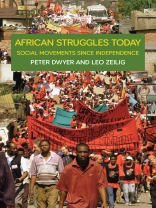Three leading Africa scholars investigate the social forces driving the democratic transformation of postcolonial states across southern Africa. Extensive research and interviews with civil society organizers in Zimbabwe, South Africa, Zambia, Malawi, Namibia, and Swaziland inform this analysis of the challenges faced by non-governmental organizations in relating both to the attendant inequality of globalization and to grassroots struggles for social justice.
Peter Dwyer is a tutor in economics at Ruskin College in Oxford.
Leo Zeilig Lecturer at the Institute of Commonwealth Studies, University of London.
Table des matières
- Chapter One–Introduction
- Chapter Two–Social movements and the working class in Africa
- Chapter Three–An epoch of uprisings: Social movements in post-colonial Africa, 1945-1998
- Chapter Four–South African social movements
- Chapter Five–Social movements after the transition: Choiceless Democracies?
- Chapter Six–Frustrated transitions: social movements, protest and repression in the Democratic Republic of Congo, Zimbabwe and Swaziland
- Chapter Seven–Social Forums and the World Social Forum in Africa
- Chapter Eight–Conclusion
- Bibliography
A propos de l’auteur
Peter Dwyer: Peter Dwyer is a tutor in economics at Ruskin College in Oxford. As a lifelong trade union member, he has been involved as a researcher and campaigner in a variety of social movement campaigns in both in the UK and South Africa. He has written extensively on political change in South Africa.
Dr Leo Zeilig is a lecturer at the Institute of Commonwealth Studies, University of London. He has written widely on student movements and radical politics in Africa. He is the author of
Revolt and Protest: Student Politics and Activism in sub-Saharan Africa I.B. Tauris (London & New York, 2007) and
Class Struggle and Resistance in Africa (Haymarket Books, 2008).












